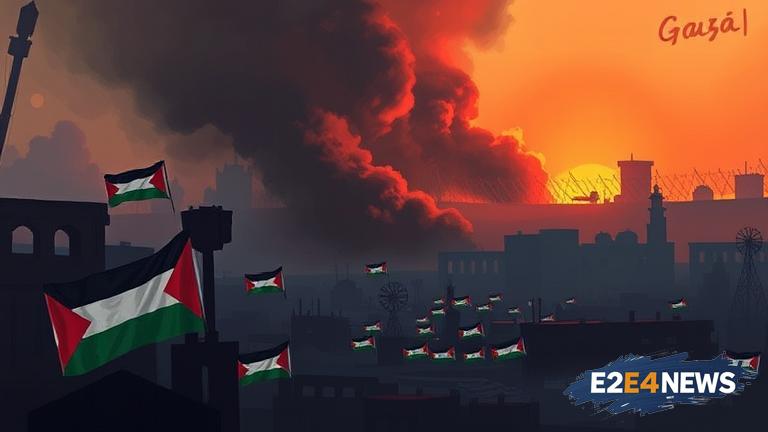The Gaza Strip, a coastal region with a population of approximately 2 million people, has been embroiled in a protracted conflict that has left its inhabitants facing an unprecedented crisis. The recent escalation of violence has resulted in a significant deterioration of the humanitarian situation, with the civilian population bearing the brunt of the conflict. The fighting has disrupted the supply of essential goods, including food, medicine, and fuel, leaving many without access to basic necessities. The consequences of this conflict are far-reaching, with the potential to unleash a humanitarian catastrophe of epic proportions. The international community has been urged to intervene and broker a ceasefire to prevent mass starvation and alleviate the suffering of the civilian population. The Gaza Strip has been under a blockade for over a decade, which has severely restricted the movement of people and goods, exacerbating the humanitarian crisis. The conflict has also resulted in significant damage to infrastructure, including hospitals, schools, and water treatment plants, further complicating the delivery of humanitarian aid. The United Nations has warned of an impending humanitarian disaster, with the potential for widespread starvation and disease. The situation is particularly dire for vulnerable populations, including children, women, and the elderly, who are disproportionately affected by the conflict. The international community has a moral obligation to act and prevent a humanitarian catastrophe. A ceasefire is essential to allow for the delivery of humanitarian aid and to prevent further suffering. The parties to the conflict must be held accountable for their actions, and the international community must take concrete steps to address the root causes of the conflict. The Gaza Strip is in urgent need of assistance, and the international community must respond with haste to prevent a humanitarian disaster. The conflict has significant regional and international implications, and a ceasefire is essential to prevent further destabilization. The humanitarian situation in the Gaza Strip is a stark reminder of the devastating consequences of conflict and the need for urgent action to protect civilian populations. The international community must come together to address the crisis and work towards a lasting resolution. The Gaza Strip is a densely populated region, and the conflict has resulted in significant displacement and trauma. The psychological toll of the conflict on the civilian population, particularly children, is a significant concern. The international community must prioritize the protection of civilians and work towards a ceasefire to prevent further suffering. The conflict has also resulted in significant economic losses, with the potential to exacerbate poverty and inequality. The Gaza Strip is in urgent need of reconstruction and development, and the international community must provide support to help rebuild the region. The humanitarian crisis in the Gaza Strip is a complex issue, requiring a comprehensive and multifaceted response. The international community must work together to address the root causes of the conflict and provide urgent assistance to prevent a humanitarian catastrophe.





